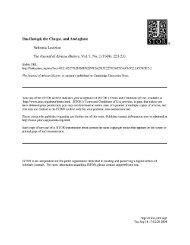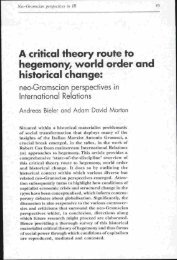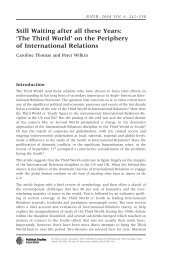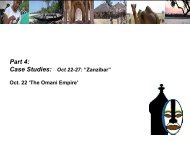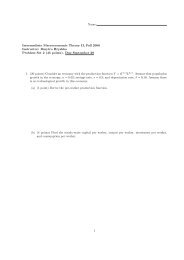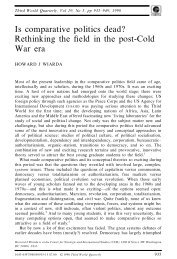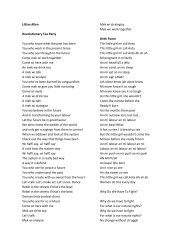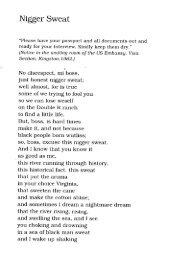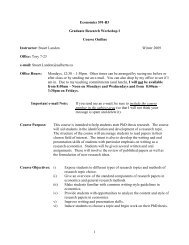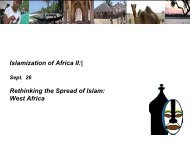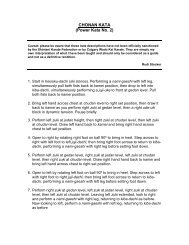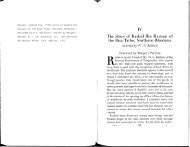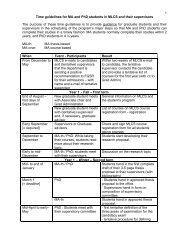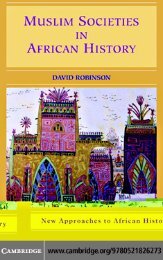personal memories revolutionary states and indian ocean migrations
personal memories revolutionary states and indian ocean migrations
personal memories revolutionary states and indian ocean migrations
Create successful ePaper yourself
Turn your PDF publications into a flip-book with our unique Google optimized e-Paper software.
(London: Society for the Promotion of Christian Knowledge, 1885). Anton Tien, “The Apology of al-<br />
Kindi,” The Early Christian-Muslim Dialogue, ed. N.A. Newman (Hatfield, PA: Interdisciplinary Biblical<br />
Research Institute, 1993), 515.<br />
37 Sir William Muir, The Apology of Al Kindy, written at the court of Al Mâmun (AH 215/AD 830) in defence<br />
of Christianity against Islam, with an essay on its age <strong>and</strong> authorship, read before the Royal Asiatic Society (London:<br />
Smith, Elder & Co., 1882), v, vii.<br />
38 Shaykh Muhammad b. ‘Ali b. Muhammad b. ‘Ali al-Mundhiri was a man of towering intellect. His<br />
known works include a book on theology entitled Al-Khulasa al-damigha, another book dealing<br />
specifically with the theological problem of the vision of God, which the Ibadis deny but the Sunnis<br />
affirm, a book on etiquette, a teacher’s text on grammar, <strong>and</strong> a Sufi-style prayer of petition bearing<br />
special instructions for its recitation <strong>and</strong> promises of its efficacy in revealing divine secrets. Shaykh<br />
Muhammad served as chief Ibadi judge under Sayyids Sa‘id b. Sultan (1832-56) <strong>and</strong> Sa‘id’s son Majid<br />
(1856-70), until the shaykh died in 1869. His position was inherited by his younger brother, ‘Abdallah.<br />
Shaykh Muhammad’s cousin, Muhammad b. Sulayman b. Muhammad al-Mundhiri, was chief Ibadi<br />
judge during the reign of Sayyid Barghash b. Sa‘id (1870-88) <strong>and</strong> was among those who accompanied<br />
Sayyid Barghash during his visit to Europe in 1875. Later, Shaykh Muhammad b. ‘Ali’s son, ‘Ali b.<br />
Muhammad al-Mundhiri, born in 1866, only three years before his father’s death, became the chief<br />
Ibadi judge during the reigns of Sayyids ‘Ali b. Hamud (1902-11) <strong>and</strong> Khalifa b. Harub (1911-60), until<br />
he died in 1924-5. The Mundhiri family had lived in East Africa for generations before the coming of<br />
Sayyid Sa‘id. Steere, A H<strong>and</strong>book of the Swahili Language, viii, thanks a “Sheikh Mohammed bin Ali, a<br />
man of the greatest research” for a copy, in his own h<strong>and</strong>, of some very famous Swahili poetry, with<br />
an interlinear Arabic version, as well as a paraphrase of it in modern language. This likely was<br />
Muhammad b. ‘Ali al-Mundhiri.<br />
39 Mundhiri’s original manuscript, entitled Kitab fi ’l-radd ‘ala ’l-nasara, written in his own h<strong>and</strong>, is #ZA<br />
8/10, 316 pages, in the Zanzibar National Archives, <strong>and</strong> it appears to be the original, with many<br />
crossed-out pages, but it is incomplete: pages 80-281 are missing. He says that he wrote it from 19<br />
Rajab until 23 Ramadan 1308 (28 February until 2 May 1891), <strong>and</strong> adds that it took him so long to<br />
write it because he was busy teaching Islamic law at the mosque. A complete copy of the manuscript<br />
is in the Ministry of National Heritage <strong>and</strong> Culture (MNHC) ms. #2089, 295 pp., copied by ‘Abdallah<br />
b. Musbih al-Sawafi for Shaykh ‘Ali b. Muhammad b. ‘Ali b. Muhammad al-Mundhiri on 21 Muharram<br />
1309 (26 August 1891). All references to page numbers here are to the MNHC edition, unless<br />
otherwise stated.<br />
40 Tien, “Apology of al-Kindi,” 384-8.<br />
41 Ibid., 401.<br />
42 Mundhiri, Kitab fi ’l-radd, 30, says, “Know that I have read four editions of the Torah: The first was<br />
published by “Rigarn” [?] Watts in London in 1831 A.D., based on the text published in Rome in<br />
1471; the second edition was published by William Watts, also in London, in 1857 A.D.; the third was<br />
published by Oxford University Press in 1871 A.D.; <strong>and</strong> the fourth is a Swahili translation of the Bible<br />
published in 1879.” This indicates that Mundhiri was fluent in English as well as Swahili, but that he<br />
had not read the Bible in Arabic, the language of his <strong>and</strong> Kindi’s treatises. Sometimes he uses Kindi’s<br />
quotations of Bible verses, <strong>and</strong> at one point, in his discussion of Psalm 110 (p. 264), he objects to the<br />
use of rabb for the second “lord” in Kindi’s quotation of “The Lord said to my lord” (Ps. 110:1),<br />
suggesting that Kindi’s text had been distorted, <strong>and</strong> that the original should have used sayyid instead.<br />
All page numbers for Mundhiri’s text refer to the MNHC manuscript, unless otherwise stated. An<br />
online search for information on the English-language Bible translations to which he refers was<br />
unsuccessful, but there is a reference to a “Missionary Register for 1830 containing the principal<br />
transactions of the various institutions for propagating the gospel,” issued by the Church Missionary<br />
Society <strong>and</strong> printed by an R. Watts in London.<br />
43 Mundhiri, Kitab fi ’l-radd ‘ala ’l-nasara, 6-8.<br />
44 Ibid., 11-13.<br />
45 Ibid., 15-17.<br />
46 Our present-day Arabic translations of the Bible, largely the work of Protestant missionaries,<br />
translate “God” in Genesis 1:1 as Allah, but perhaps in Kindi’s time Elohim was translated al-aliha.<br />
47 Mundhiri, Kitab fi ’l-radd ‘ala ’l-nasara, 29.<br />
48 Ibid., 32-34. Genesis 18:1-3 reads: “The Lord appeared to Abraham by the oaks of Mamre, as he sat<br />
at the entrance of his tent in the heat of the day. He looked up <strong>and</strong> saw three men st<strong>and</strong>ing near him.<br />
When he saw them, he ran from the tent entrance to meet them, <strong>and</strong> bowed down to the ground. He<br />
said, ‘My lord, if I find favor with you, do not pass by your servant.’” In Gen. 18:16, “The men set out<br />
from there, <strong>and</strong> they looked toward Sodom; <strong>and</strong> Abraham went with them to set them on their way.<br />
The Lord said, “Shall I hide from Abraham what I am about to do . . . ?” In Gen. 18:22, “So the men<br />
http://web.mit.edu/cis/www/mitejmes/<br />
75



